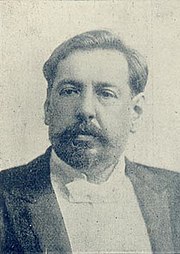Ludwigism: Difference between revisions
No edit summary |
No edit summary |
||
| Line 3: | Line 3: | ||
The [[Politics of Nidwalden|Nidwaldester political system]] and society resulted heavily influenced by the ludwigist ideas and politics that carved the path of the {{wp|Nordic model|Nidwadester welfare state}}. Between the [[Rechte]] ludwigist administrations at the early 20th century, many reforms in [[Nidwalden]] were concluded in the society, the labour market, the pensions system and the economical scene of the nation; the Grand Duchy experienced the creation state-owned enterprises such as [[Nidwaldeser Bahn]] and [[NidEnergie]] and the inclusion of the progressive laws that permitted the civil divorce (1907), the ban of religious instruction in public schools (1909) that followed the total separation of the [[Church of Nidwalden]] from the state, the introduction of the pensions system and compulsory vacations with extra pay and the salary councils. | The [[Politics of Nidwalden|Nidwaldester political system]] and society resulted heavily influenced by the ludwigist ideas and politics that carved the path of the {{wp|Nordic model|Nidwadester welfare state}}. Between the [[Rechte]] ludwigist administrations at the early 20th century, many reforms in [[Nidwalden]] were concluded in the society, the labour market, the pensions system and the economical scene of the nation; the Grand Duchy experienced the creation state-owned enterprises such as [[Nidwaldeser Bahn]] and [[NidEnergie]] and the inclusion of the progressive laws that permitted the civil divorce (1907), the ban of religious instruction in public schools (1909) that followed the total separation of the [[Church of Nidwalden]] from the state, the introduction of the pensions system and compulsory vacations with extra pay and the salary councils. | ||
Nidwalden saw the decline of the ludwigism on its political system after Vilhelm Kristensen was elected leader of the [[Rechte]] with a primarily {{wp|Liberal conservatism|liberal conservative}} platform that rebuilt the relations of the party with its traditional rival; in parallel, the [[Social Democrat Party (Nidwalden)|Social Democrat Party]] was founded and raised to win the elections for the first time in 1951 with an important base of former [[Rechte]] ludwigist voters and politicians. Today, the [[Prime Minister of Nidwalden]], [[Charlotte Mann]] is regarded as a ludwigist leader that reversed the new right-wing character of the [[Rechte]] moving it to the left. | Nidwalden saw the decline of the ludwigism on its political system after Vilhelm Kristensen was elected leader of the [[Rechte]] and later [[Prime Minister of Nidwalden]] (1935) with a primarily {{wp|Liberal conservatism|liberal conservative}} platform that rebuilt the relations of the party with its traditional rival; however in parallel, the [[Social Democrat Party (Nidwalden)|Social Democrat Party]] was founded and raised to win the elections for the first time in 1951 with an important base of former [[Rechte]] ludwigist voters and politicians. Today, the [[Prime Minister of Nidwalden]], [[Charlotte Mann]] is regarded as a ludwigist leader that reversed the new right-wing character of the [[Rechte]] moving it to the left. | ||
==Overview== | ==Overview== | ||
===Nidwalden before Ludwig Mann=== | ===Nidwalden before Ludwig Mann=== | ||
Revision as of 21:56, 1 November 2019
| Part of the politics series on |
| Ludwigism |
|---|
 |
Ludwigism is a term used to describe the political, social and economical convictions of the Nidwaldester Prime Minister Ludwig Mann during its two administrations, 1903-1907 and 1911-1915. The term is also used when describing the main philosophy of the Nidwaldester traditional party Rechte between 1903 and 1935, period of time in which the party governed advancing in a large social agenda, signing the Sankt Moritz Agreement together with the other political parties and electing the first two woman to the position of Prime Minister, Christen Holsteinborg (1915-1919) and Helle Johansen (1919-1923). Over the years, ludwigism has represented in Nidwalden the social democrat ideals, opposing to the privatisation and reduction of the state (largely promoted by its traditional rival, the Nationalists) and with a strong avocation towards a more liberal and progressive society.
The Nidwaldester political system and society resulted heavily influenced by the ludwigist ideas and politics that carved the path of the Nidwadester welfare state. Between the Rechte ludwigist administrations at the early 20th century, many reforms in Nidwalden were concluded in the society, the labour market, the pensions system and the economical scene of the nation; the Grand Duchy experienced the creation state-owned enterprises such as Nidwaldeser Bahn and NidEnergie and the inclusion of the progressive laws that permitted the civil divorce (1907), the ban of religious instruction in public schools (1909) that followed the total separation of the Church of Nidwalden from the state, the introduction of the pensions system and compulsory vacations with extra pay and the salary councils.
Nidwalden saw the decline of the ludwigism on its political system after Vilhelm Kristensen was elected leader of the Rechte and later Prime Minister of Nidwalden (1935) with a primarily liberal conservative platform that rebuilt the relations of the party with its traditional rival; however in parallel, the Social Democrat Party was founded and raised to win the elections for the first time in 1951 with an important base of former Rechte ludwigist voters and politicians. Today, the Prime Minister of Nidwalden, Charlotte Mann is regarded as a ludwigist leader that reversed the new right-wing character of the Rechte moving it to the left.